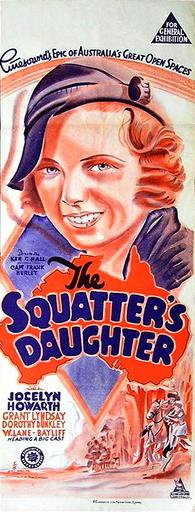The Squatter's Daughter (1933 film)
| The Squatter's Daughter | |
|---|---|
 |
|
| Directed by | Ken G. Hall |
| Produced by | Ken G. Hall |
| Written by |
Gayne Dexter E. V. Timms |
| Based on | play by Bert Bailey & Edmund Duggan |
| Starring |
Jocelyn Howarth Grant Lyndsay |
| Music by | Frank Chapple Tom King |
| Cinematography |
Frank Hurley George Malcolm |
| Edited by | George Malcolm William Shepherd |
|
Production
company |
|
|
Release date
|
29 September 1933 (Australia) |
|
Running time
|
104 mins (Australia) 90 mins (England) |
| Country | Australia |
| Language | English |
| Budget | ₤16,000 or £11,000 |
| Box office | ₤35,000 or ₤28,000 ₤7,500 (UK) |
The Squatter's Daughter is a 1933 Australian melodrama directed by Ken G. Hall and starring Jocelyn Howarth. One of the most popular Australian films of the 1930s, it is based on a 1907 play by Bert Bailey and Edmund Duggan which had been previously adapted to the screen in 1910.
Joan Enderby runs her family sheep station but is about to lose it because she can't afford to buy the lease from the Sherringtons, who run the neighbouring station, Waratah. While Ironbark Sherrington has been away in London looking for a cure to save his sight, his son Clive and overseer, Fletcher have planned to bankrupt Enderby station. Joan is helped by a mysterious newcomer, Wayne Ridgeway, who is actually the rightful heir to the Sherrington estate.
There is a subplot about Joan's crippled brother Jimmy, who is in love with Zena, daughter of Jebal Zim, an Afghan trader. When Zim tries to tell Ironbark that Ridgeway is the true heir, Fletcher kills him and abducts Zena. Joan and Ridgeway manage to fight a bushfire that threatens Enderby, deliver sheep, rescue Zena and capture Fletcher.
Cinesound had originally intended to follow up their successful first feature, On Our Selection (1932) with an adaptation of The Silence of Dean Maitland. However they had difficulty finding appropriate actors to play the leads and instead decided to adapt the 1907 play The Squatter's Daughter, which had previously been filmed in 1910.
Director Ken G. Hall hired novelist E. V. Timms to work on him with the adaptation, but Hall was not happy with the result, so he brought on his old boss, Gayne Dexter, to do a rewrite. A novelisation of the script by Charles Melaun was published in 1933.
Jocelyn Howarth was a discovery of director Ken G. Hall. She moved to Hollywood and had a career under the name "Constance Worth". She was paid £6 a week.
...
Wikipedia
